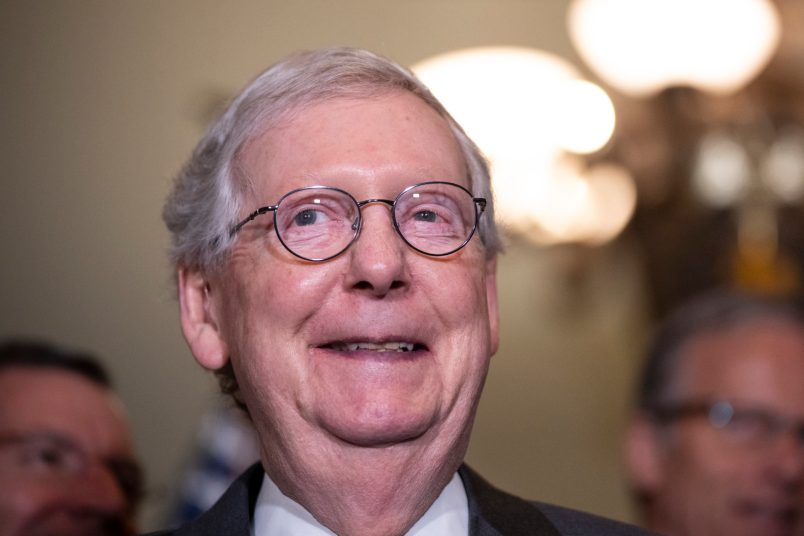Mitch McConnell is one of those perhaps historic figures for whom the greatness of his skill and impact are matched only in inverse by the malignity of his impact on our politics. To put it more brashly, McConnell was great at doing political evil. There is now a kind of rearguard effort to remake McConnell as an institutionalist, a last vestige of the pre-Trumpian GOP. And on that last point, being a vestige, there’s some truth. On being an institutionalist, not at all.
Mitch McConnell’s great legacy is the thorough institutionalization of minority rule in U.S. politics, especially at the federal level. The first and most obvious part of that is that McConnell, more than anyone else, is the man who broke the United States Senate, largely by domesticating the filibuster. No more a wild bull kept out in the stockade for ugly moments but now living within the household, almost a family member, though no less dangerous and wild.
No one acts totally on their own. McConnell’s period of power coincides with the increasing partisan polarization of U.S. politics. You can’t get today’s filibuster without that polarization. The use of the filibuster was already growing before McConnell took the reins. Yes, it was used by both parties, but in the traditional Washington pattern: with Republicans pioneering the new ground and Democrats playing catch-up. But McConnell is the one who brought it all together, who saw on the ground before him the various parts half-formed and made a well-running system out of them. That in turn put the process of polarization into overdrive, marrying the cultural-political trends to the structural frameworks of state power.
These days you often hear reporters and commentators saying matter of factly that legislation requires 60 votes in the Senate. This is truly McConnell’s greatest accomplishment. People say this like it’s in the Constitution, like the two-thirds requirement for conviction at impeachment or to approve a treaty. But it is a novel development and it has radically altered U.S. politics. It transforms the federal Senate into a genuinely Calhounian body in which minority factions exercise a de facto and permanent veto over the majority.
It’s what creates gridlock, the breeding ground of political disaffection and extremism.
It also lays the groundwork for McConnell’s other great accomplishment, the corrupted federal judiciary and especially the corrupt Supreme Court. By throwing a wrench into the engine of legislation you create a vacuum that is inevitably filled by an increasingly activist judiciary. They are the yin and yang of today’s federal government, a broken legislative branch whose vacuum is filled by a right-wing activist federal judiciary. Thus McConnell’s only affirmative goal as Senate leader: the confirmation of right wing judges, who in this system amounted to the appointment of a permanent Republicanized federal legislature.
The irony of McConnnell’s rise and fall is that he is now ushered off the stage by the Trumpian politicos who he is not equal to but whose rise he made possible by breaking the legislative branch.
McConnell wasn’t faking when he expressed shock at the lawless violence of January 6th or the Trumpian penchant for election denial. But power has always been his calling card and anchor. I am sure McConnell wanted to remove and ban Trump from office after the shame and outrage of January 6th. He said as much. But that brings us to a true understanding of McConnell’s power and its limits. He was so good at his job and held power for so long because he was so good at leading his caucus where it wanted to go. It took him only a couple days to determine that banning Trump was a step too far. He was never more powerful than where he understood he could get enough of his caucus, with cajoling and carrots and sticks, to go.
McConnell’s clear determination and continuing efforts to secure Ukraine aid are another example. McConnell is a stalwart of the Cold War and post-Cold War establishment order — now a rarity in the GOP. Ukraine’s embrace of Europe, democracy and steps toward a rule-of-law state are great. But the real issue is America’s great power rivalry with its two peer rivals on the Eurasian mainland, in this case Russia. It’s clear that to McConnell not funding this conflict where U.S. values and great power interests are so clearly aligned is the most obvious kind of own goal.
Any lauding of McConnell as a last gasp of the “old Republican Party” is just so much claptrap which papers over all of the above. But he is different from the Trump faction which now dominates the GOP. I think McConnell’s ideal America is a conservative America which governs itself in an orderly and dignified fashion in line with the rule of law, where the rule of law is defined and administered by a self-sustaining Republican judiciary which entrenches minority rule and sees to the electoral interests of the Republican Party. I believe Trumpian abuses genuinely offend him. The irony of his career is that his ideal of American government was no steady state. It is a steeply tilted playing field which leads the center-right party of government, the American Republican Party’s historic role, inevitably to the kind of revanchist authoritarianism Trump embodies and which is now, according McConnell, beset by a mounting physical frailty rich with symbolism, no more than a semi-dignified exit from political power.


 Member Newsletter
Member Newsletter
